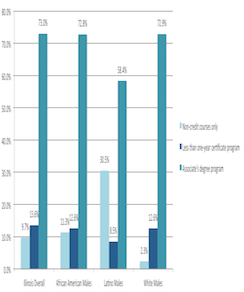Due to a globalized and knowledge driven economy, the demand for more U.S. citizens with postsecondary credentials is increasing. Scholars suggest that in order to improve postsecondary degree production, the primary focus should be on improving outcomes for traditionally underserved populations with lower levels of postsecondary attainment. The Illinois Board of Higher Education (IBHE) echoes these sentiments as it has determined that colleges must better serve underserved student populations, specifically underrepresented males of color (African American and Latino), in order to meet state and federal degree completion goals. For underrepresented males of color, community colleges are often the point of entry into postsecondary education which puts community colleges in a critical position to address credentials gaps and improve the outcomes of underrepresented males of color as well as other underserved student populations.
The ninth issue of Insights into Equity and Outcomes, Enrollment and Credential Attainment Among Underrepresented Males of Color Attending Community Colleges in Illinois, examines the distribution of enrollment and credentials by subgroups, namely underrepresented males of color, in 2001 and 2011. Findings from the analysis show that the likelihood of African Americans males to be enrolled in associate’s degree programs is comparable to that of White males and the total student population. However, African American males are more likely to earn a less-than-one-year certificate and less likely to earn associate’s degrees than White males. Similarly, whereas the number of Latino males who were enrolled and conferred degrees improved over this 10-year period, these males behind their White male counterparts and the total student population. Yet, Latino males were more likely to receive an associate’s degree compared to African American males. From your perspective, what barriers do underrepresented males of color experience that account for these trends? In what ways does your institution seek to improve outcomes for traditionally underserved students?
Edmund Graham III, M.Ed., is a doctoral student in Education Policy, Organization and Leadership with a specialization in Higher Education at the University of Illinois at Urbana-Champaign and currently works as a Graduate Research Assistant for OCCRL.
